US President Donald Trump has said he was "disappointed" to hear that Ukraine had complained about being cut out of talks between the United States and Russia in Saudi Arabia on ending the Ukraine war.
"I'm very disappointed, I hear that they're upset about not having a seat, well they've had a seat for three years and a long time before that," he told reporters in Mar-a-Lago when asked what he would say to Ukrainians who feel "betrayed".
"I think I have the power to end this war," he added, after saying that he was "much more confident" of a deal with Russia after talks in Saudi Arabia.
Mr Trump also said Ukraine "should have never started" the war with Russia, adding that it could have made a deal three years ago.
"But today I heard 'oh we weren't invited', well you've been there for three years, you should have ended it three years [ago]," Mr Trump said.
"You should have never started it, you could have made a deal."
It comes as Russia and the United States have agreed to establish teams to negotiate a path to ending the war in Ukraine after talks that drew a strong rebuke from Ukraine over its exclusion.
The US noted European nations would have to have a seat at the negotiating table "at some point", following the first high-level official US-Russia talks since the 2022 invasion of Ukraine.
Some European leaders, alarmed by President Donald Trump's overhaul of US policy on Russia, fear the US will make serious concessions to Russia and re-write the continent's security arrangement in a Cold War-style deal.
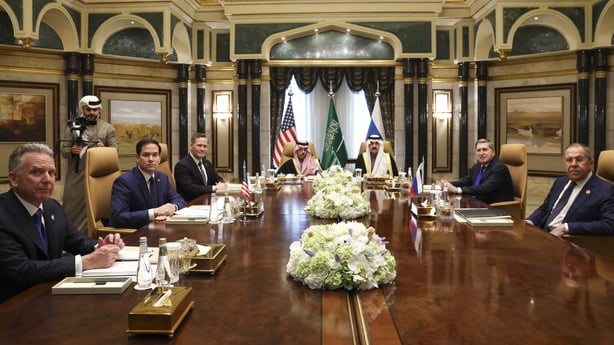
Zelensky criticises exclusion from talks
Ukrainian President Volodymyr Zelensky slammed his nation's exclusion from the Riyadh gathering, which lasted for more than four hours.
He said that any talks aimed at ending the war should be "fair" and involve European countries, including Turkey - which offered to host negotiations.
"This will only be feeding Putin's appetite," a Ukrainian senior official requesting anonymity said, referring to the launch of talks without Ukraine.
The Trump administration said it agreed to hold more talks with Russia on ending the war in Ukraine after the initial meeting in Riyadh.
It marked a departure from the White House's previous approach that rallied US allies to isolate Russian President Vladimir Putin.
As the 4-1/2-hour meeting in the Saudi capital was under way, Russia hardened its demands, notably insisting it would not tolerate the NATO alliance granting membership for Kyiv.
It was the first time US and Russian officials have sat down together to discuss ways to halt the deadliest conflict in Europe since World War II.
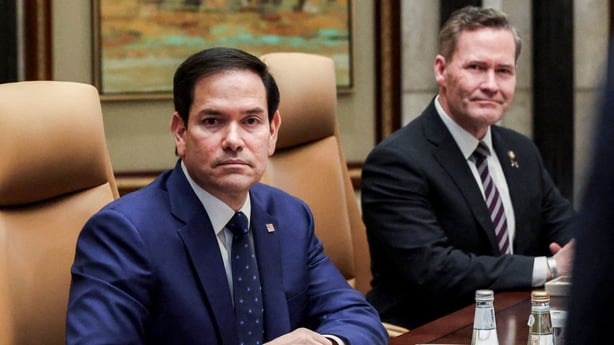
Ukraine has said it will not accept any deal imposed without its consent, and German Chancellor Olaf Scholz reiterated "there must be no decision over the heads of Ukraine".
Even before the talks took place, some European politicians accused Mr Trump's administration of handing free concessions to Russia last week by ruling out NATO membership for Ukraine and saying it was an illusion for Kyiv to believe it could win back the 20% of its territory now under Russian control.
Read More:
Trump, Putin and Ukraine: The great betrayal?
Ireland 'not at point' deciding peacekeeping role in Ukraine, says Tánaiste
US National Security Adviser Mike Waltz told reporters in Riyadh that the war must come to a permanent end, and this would involve negotiations over territory.
"Just a practical reality is that there is going to be some discussion of territory and there's going to be discussion of security guarantees," he said.
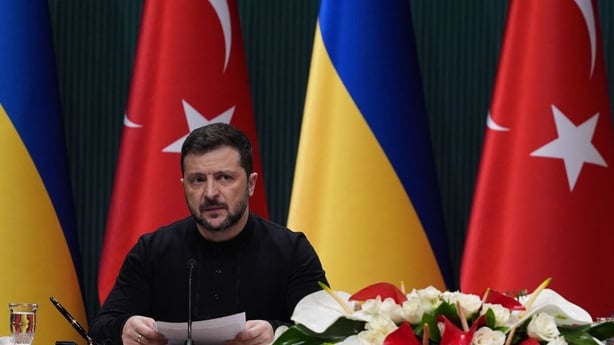
High-level teams would begin talks on ending the conflict and would separately work to restore the countries' respective diplomatic missions in Washington and Moscow to ease the talks going forward, US Secretary of State Marco Rubio said.
Mr Rubio said he came away from the initial talks convinced that Russia was "willing to begin to engage in a serious process" but that reaching peace would involve concessions from all sides.
Addressing Ukrainian and European concerns, Mr Rubio said no one was being sidelined, the European Union needed to be involved at some point, and any solution must be acceptable to all parties.
Ukrainian President Volodymyr Zelensky said he has postponed a visit to Saudi Arabia planned for tomorrow until next month, and that talks on how to end the war with Russia could not be held behind Ukraine's back.
Sources familiar with the matter said the decision was made to avoid giving "legitimacy" to the US-Russia talks.
Speaking earlier in Turkey, Mr Zelensky said the trip would be postponed as he did not want "any coincidences"
Even as the meeting in the Saudi capital was under way, Russia hardened its demands.
Foreign Ministry spokeswoman Maria Zakharova told reporters in Moscow it was "not enough" for NATO not to admit Ukraine as a member.
She said the alliance must go further by disavowing a promise it made at a summit in Bucharest in 2008 that Ukraine would join at a future, unspecified date.
"Otherwise, this problem will continue to poison the atmosphere on the European continent," she said.
Mr Zelensky has consistently demanded NATO membership as the only way to guarantee Ukraine's sovereignty and independence from its nuclear-armed neighbour.
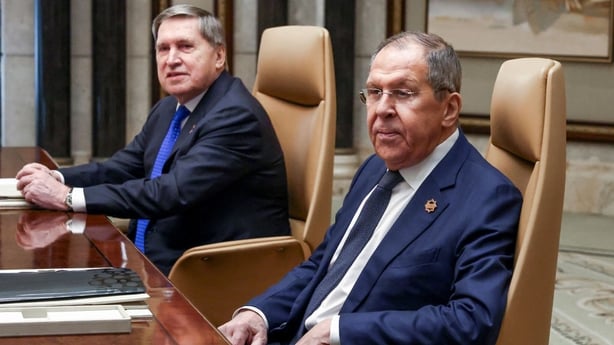
As European countries discuss the possibility of contributing peacekeepers to back any Ukraine peace deal, Russian Foreign Minister Sergei Lavrov also said in Riyadh that Russia would not accept the deployment of NATO troops there, whatever flag they were operating under.
"Of course, this is unacceptable to us," he said.
Both sides said no date had been set for a meeting between Mr Trump and Russian President Vladimir Putin, which both men say they want.
But the fast-moving diplomacy, beginning with a Putin-Trump phone call only six days ago, has triggered alarm in Ukraine and European capitals that the two leaders could cut a quick deal that ignores their security interests, rewards Russia for its invasion and leaves Mr Putin free to threaten Ukraine or other countries in the future.
We need your consent to load this rte-player contentWe use rte-player to manage extra content that can set cookies on your device and collect data about your activity. Please review their details and accept them to load the content.Manage Preferences
Europe seeks to retain influence
It remains unclear how Europe will engage the United States after Mr Trump stunned Ukraine and European allies by bringing Mr Putin in from the cold.
European leaders holding emergency talks yesterday called for higher spending to ramp up the continent's defence capabilities but remained split on the idea of deploying peacekeepers to Ukraine.
The leaders also agreed it would be dangerous to conclude a Ukraine ceasefire without a peace agreement at the same time, and that they were ready to provide security guarantees to Ukraine "depending on the level of American support", a European official said.
British Prime Minister Keir Starmer, who said before the meeting that he was willing to send peacekeeping troops, said there must be a US security "backstop" for European countries to put boots on the ground.
Keith Kellogg, Mr Trump's Ukraine envoy, said he would visit Ukraine from tomorrow and was asked if the US would provide a security guarantee for any European peacekeepers.
"I've been with President Trump, and the policy has always been: You take no options off the table," he said.
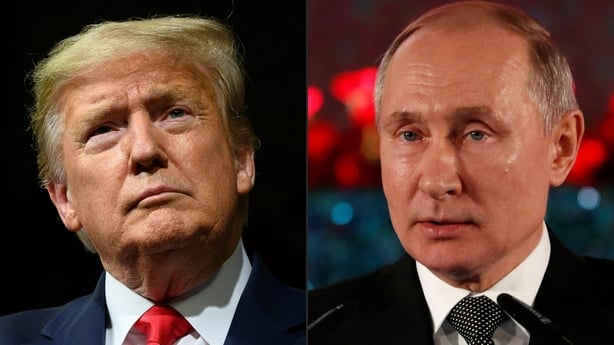
Developing US-Russia relations
Russia launched a full-scale invasion of Ukraine in February 2022, eight years after seizing Crimea and fomenting an insurgency in the east of the country - of which he now controls about a fifth.
Mr Trump ran for president last year on a repeated promise to end the conflict within 24 hours, though his officials now concede it will take months.
He has described the war as "ridiculous" and said it is "destroying" Russia.
Russia, however, has sounded increasingly confident in recent months as its troops have advanced at their fastest pace since 2022 and Mr Trump's overtures have ended its near-total isolation from the West.
Under Mr Trump's predecessor, Joe Biden, the Kremlin had described relations as "below zero".
US officials previously cast the talks in Riyadh as an initial contact to determine whether Russia is serious about ending the war after Mr Putin and Mr Trump spoke last week.
The Kremlin had suggested the discussions would cover "the entire complex of Russian-American relations".
Mr Putin and Mr Trump said that, apart from the war, they were keen to discuss issues such as nuclear arms control and how to bring down global energy prices.

